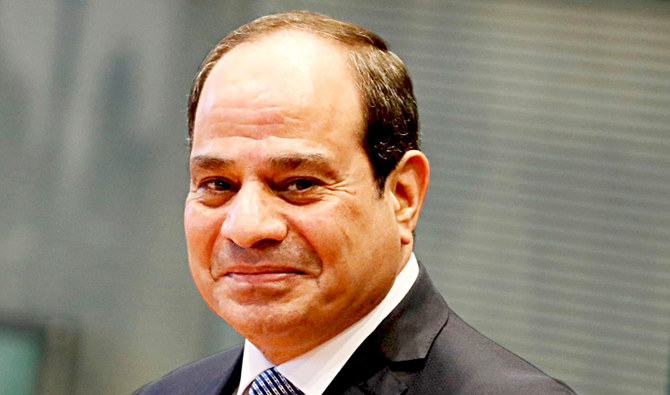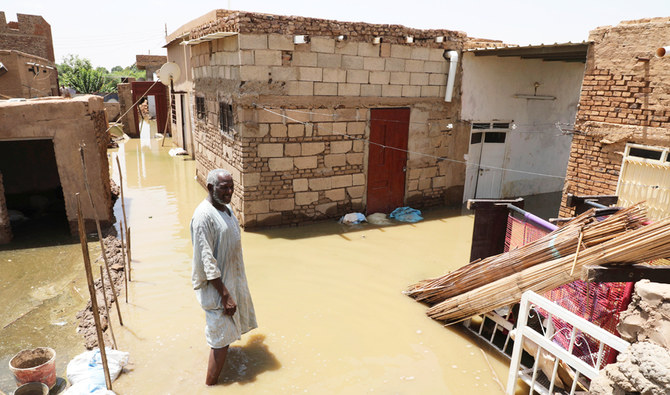CAIRO: Egypt has sent two military transport aircraft containing food, medicine and rain-resistant tents to Khartoum amid heavy flooding in Sudan.
Egyptian Armed Forces spokesman Tamer Al-Rifai said that preparing the aid came under the direction of Egyptian President Abdel Fattah El-Sisi as part of Egypt’s solidarity with the people of Sudan.
Faisal Mohammed Saleh, Sudanese minister of culture and information, said that there are feelings of sincerity from the people of Egypt toward the Sudanese.
“We have been immersed in the love of the Egyptians since yesterday, and their solidarity on social media,” Saleh said.
“We know the depth of the relations between the two countries and due to political circumstances, the two countries have been affected, but the relationship between them remains strong. We are grateful to the Egyptian government for sending urgent aid to Sudan,” he added.
In the country, 16 states have been affected by flooding, seven of which have been severely hit, resulting in about 100 deaths.
Sudan’s capital Khartoum was most impacted by the floods.
The minister said that damage is worsening due to the amount of buildings and the large population. He added that the flooding is the most extreme in over a century.
“We harnessed all the available resources and everyone is working as a team, but there is severe damage that will take a long time to repair,” Saleh said.
President El-Sisi declared his solidarity with the government and people of Sudan due to the rain and floods.
“My sincere solidarity with our Sudanese brothers, the government and the people, as a result of the rain and floods sweeping through Sudan, which led to tragic losses of individuals and property,” he said in a Facebook post.
I affirm Egypt’s constant readiness to provide all means of support to our Sudanese brothers in this critical period, to deal with the effects of the floods.
Abdel Fattah El-Sisi, President of Egypt
“I affirm Egypt’s constant readiness to provide all means of support to our Sudanese brothers in this critical period, to deal with the effects of the floods,” he added.
After heavy rain fell on southern Upper Egypt, the Red Sea mountain ranges and South Sinai, Egyptians feared that they too would face similar flooding.
“These days we are affected by the seasonal trough of Sudan, which causes torrential flow in the Red Sea, South Sinai and South Sudan. If we are affected by it, then how can we not think about its impact on Sudan,” said Ahmed Abdel-Aal, former head of the Egyptian Meteorological Authority.
He added that Egypt has taken precautions to prevent potential flooding.
A source in the Egyptian Meteorological Authority denied that Egypt was affected by the heavy rainfall.
On Saturday, several roads in the southern Red Sea governorate saw severe rain, including desert valleys in the 85 km area of Safaga-Qena road.
The Egyptian Ministry of Water Resources and Irrigation said it monitored the quantity of rain that fell on some of Upper Egypt’s governorates, and that they are concerned with rainfall at the Nile’s headwaters.
“We are in the beginning of a water year. The floods will reach Egypt over three months in August, September and October,” said Mohammed El Sebaei, the ministry’s spokesman.
He said the High Dam will protect Egypt from flooding, as the dam can discharge surplus water if its storage capacity is reached.
El Sebaei said the situation in Egypt is different from Sudan and that flooding is unlikely.
Russian news agency Sputnik quoted Abdel-Fattah Mutawa, former head of the water resources sector at the Egyptian Irrigation Ministry, who said Egypt should empty part of Lake Nasser’s water to the Toshka spillway and purify the inlets at the end of the Rashid and Damietta branch.
Mutawa added that agricultural drainage stations must be kept in a state of readiness.





























